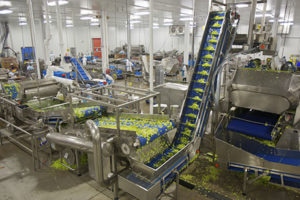Introduction
In today's quickly progressing food sector, companies are seeking sustainable solutions to meet the expanding need for Homepage top quality food while reducing their environmental effect. Contract food manufacturing has emerged as a practical alternative for business seeking to outsource their manufacturing requires while maintaining control over item advancement as well as quality control. This write-up discovers the concept of contract food manufacturing in Australia as well as its duty in promoting sustainability within the food industry.
The Surge of Contract Food Manufacturing in Australia
Understanding Contract Food Manufacturing
Contract food manufacturing is a tactical collaboration in between a brand name owner as well as an agreement supplier, where the latter creates goods in behalf of the previous. This plan enables brand proprietors to concentrate on advertising, product growth, as well as circulation while leveraging the experience and also sources of specialized contract manufacturers.
Benefits of Contract Food Manufacturing
Cost Performance: Contract food manufacturing gets rid of the requirement for significant capital expense in facilities, tools, as well as manpower. This cost-saving procedure enables brands to allot their resources towards other critical locations of business growth. Scalability: As demand for a certain item rises and fall, agreement manufacturers can rapidly readjust manufacturing levels to fit market demands. This flexibility makes sure that brands can meet customer demand without excess stock or wastage. Expertise and Advancement: Agreement suppliers usually possess comprehensive knowledge and experience in certain food categories or processes. By collaborating with these experts, brand names can take advantage of their creative thinking and also harness ingenious remedies for item growth and also improvement. Quality Guarantee: With strict quality control actions in place, agreement manufacturers follow industry requirements and also governing demands. This commitment to excellence ensures that brands provide secure and also top quality products to customers consistently. Supply Chain Administration: Contract food manufacturing streamlines the supply chain by consolidating manufacturing, packaging, labeling, and also circulation under one roof covering. This integrated technique lessens logistical complexities and improves general operational efficiency.The Ecological Impact of Agreement Food Manufacturing
Reducing Carbon Footprint
Contract food production offers opportunities to decrease the environmental effect of food manufacturing via different ways:
Efficient Source Utilization: Contract producers enhance resource consumption by implementing energy-saving methods, lessening water use, and minimizing waste generation. These sustainable actions contribute to a lower carbon impact across the whole production process. Locally Sourced Components: By sourcing ingredients from local suppliers, agreement suppliers reduce transportation distances as well as associated emissions. This technique supports local economic climates while promoting sustainability within the supply chain. Eco-Friendly Product packaging: Contract food manufacturers highlight making use of eco-friendly packaging materials, such as eco-friendly or recyclable alternatives. This dedication to lasting product packaging minimizes waste and cultivates accountable consumption.Embracing Sustainable Energy
Contract food manufacturing facilities in Australia are significantly taking on renewable resource sources to power their procedures. Solar panels, wind generators, and also various other clean energy remedies help reduce reliance on nonrenewable fuel sources as well as add to a greener future for the industry.
Addressing Sustainability Difficulties in Contract Food Manufacturing
Waste Administration as well as Reusing Initiatives
Contract food producers focus on waste administration through detailed recycling programs and also waste decrease strategies. By applying effective waste partition systems, business can divert substantial amounts of waste from garbage dumps and also advertise a circular economy.
Water Conservation Measures
Water shortage is an international issue, and also contract food manufacturers play their component in resolving this obstacle. Business invest in water-saving modern technologies, such as advanced filtering systems as well as water reuse efforts, to minimize their freshwater consumption.
Collaboration with Lasting Suppliers
Contract food makers proactively seek collaborations with distributors committed to sustainable practices. By prioritizing ecologically aware distributors, these firms guarantee that their whole supply chain aligns with sustainability goals.



FAQs
What is contract food manufacturing? Contract food manufacturing refers to the outsourcing of food production to specialized suppliers who produce products on behalf of brand name owners.
How can contract food manufacturing benefit companies? Contract food manufacturing supplies expense performance, scalability, experience, as well as quality assurance to brands seeking to concentrate on marketing and also distribution.
How does contract food manufacturing advertise sustainability? By enhancing resource usage, welcoming renewable energy, and also applying waste monitoring and recycling initiatives, contract food manufacturing decreases its environmental impact.
What are some sustainable packaging alternatives in contract food manufacturing? Environmentally friendly product packaging products such as naturally degradable or recyclable options are commonly utilized in contract food manufacturing to reduce waste.
How do agreement food makers save water? Agreement food producers purchase water-saving innovations as well as apply water reuse efforts to reduce their freshwater consumption.
What role does partnership with lasting providers play in contract food manufacturing? By partnering with eco aware vendors, contract food suppliers make sure that their entire supply chain straightens with sustainability goals.
Conclusion
Contract food production offers a sustainable solution for businesses seeking to satisfy the growing need for high quality food products while reducing their environmental effect. By leveraging the expertise of specialized producers and also embracing environment-friendly practices, brand names can add to a greener future for the Australian food industry. Accepting sustainability not only benefits the atmosphere but additionally improves brand track record and also consumer rely on a progressively conscious market.